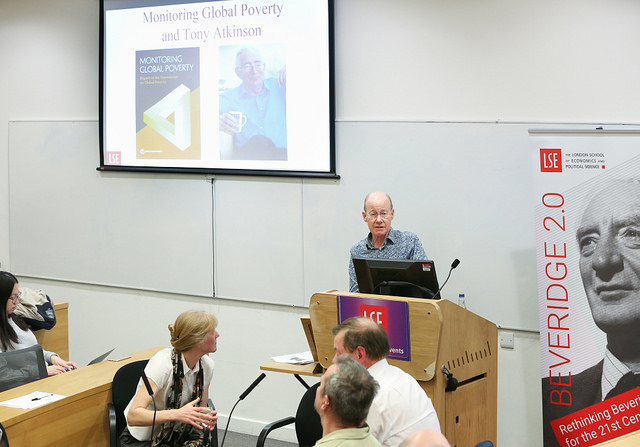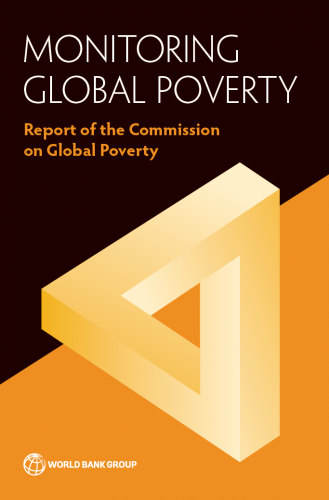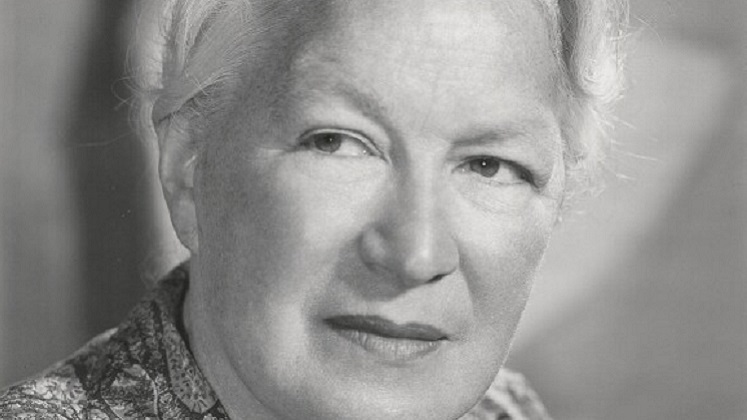At the Beveridge 2.0 LSE Festival event Five LSE Giants’ Perspectives on Poverty, Professor Stephen Jenkins explained how the World Bank is changing its methodological approach as a result of the Monitoring Global Poverty report written by an “LSE Giant”, Professor Sir Anthony (Tony) B Atkinson (1944-2017), formerly Tooke Professor of Economic Science and Statistics, 1980–1992, and Centennial Professor, 2010–17.
What we now call Poverty is what Beveridge called Want – it is one of his famous Five Giants along with Disease, Ignorance, Squalor and Idleness. Beveridge’s 1942 report famously set out proposals to address the Five Giants and it laid foundation stones for today’s welfare state. But the focus was on the UK. In today’s world, there is substantial interest in what progress is being made in the reduction of poverty in the world as a whole, particularly in developing countries – what is the prevalence of global poverty and is it increasing or falling over time?
For the last three decades, the World Bank has provided the leading estimates of the extent of global poverty, and it recently sought advice on how to improve its approach. The resulting report, Monitoring Global Poverty, written by Tony Atkinson, will have a major impact on World Bank practice.

Measuring global poverty
The World Bank’s methodology has been hugely influential but has attracted much criticism. Launched in 1990, the approach summarises how well off an individual is in terms of a monetary measure of living standards – the income or total spending per head per day of the household to which the person belongs. A person is counted as poor if this income is less than a critical cut-off – the global poverty line (GPL).
The GPL is fixed at the same amount for all countries and for all years. It is an “absolute” poverty line and its application leads to estimates of counts of the number of poor people in each country and thence in the world as a whole, and to poverty rates, which are the number of poor people expressed as a percentage of the total population. The Millennium Development Goals and Sustainable Development Goals both specify poverty reduction targets formulated using World Bank definitions of how to assess poverty. Much discussion has focused on how one translates the GPL into national currencies and how it should be set. The quality of the data used is also critical.
In order to compare living standards between countries and to convert the GPL into national currencies, the World Bank uses special exchange rates known as Purchasing Power Parities (PPPs). However, PPPs are complicated to derive and rely on huge amounts of data about prices and volumes of goods and services around the world. See the podcast and references section below for more discussion of the World Bank’s approach.
Around 13% of the world’s population were counted as being in extreme poverty in 2012, but this is around one third of the rate in 1990: global poverty has fallen dramatically. But we still can’t say whether the Millennium Development Goals poverty targets have been achieved (they refer to the situation in 2015). Poverty rates have fallen sharply in East Asia and the Pacific – reflecting in particular economic growth in China – but remain appallingly high in Sub-Saharan Africa.

Tony Atkinson’s report
Given the importance of their global poverty estimates but also the continuing controversy, the World Bank established a Commission in Autumn 2015 to advise it on two matters going forward: (1) how the Bank should define global poverty, and (2) what complementary poverty measures the Bank should also produce. The Commission was chaired by Tony Atkinson and had 23 distinguished members to advise him, but the final report was written by Tony alone.
Unusually for this sort of exercise, the Monitoring Global Poverty report was completed very quickly, within 10 months, and published in October 2016 – all the more remarkable since Tony was suffering from the cancer from which he died on January 1, 2017. Monitoring Global Poverty is an outstanding 232-page review of the matters raised by the World Bank and goes beyond them in many respects.
Among its recommendations are: detailed National Poverty Reports to be published alongside the global estimates; global and national reports including systematic information about the depth of poverty in addition to simple headcounts; and for more about who is poor in each country. More radically, the report recommends that the Bank should publish estimates based on poverty lines that take some account of the standard of living in each country; information based on “relative” as well as “absolute” poverty lines. Although, deliberately, the report does not provide new estimates of global poverty, nor does it discuss policies to reduce it, the improvement to the information base stimulated by Tony Atkinson’s work will also led to better estimates and more informed policies.
Monitoring Global Poverty raises interesting issues about how to secure changes in policy behaviour by major organisations. Some might argue that Tony’s report does not go far enough and would have sought more radical changes. By contrast, Tony’s strategy is deliberately “middle way” – the idea is that making significant progress in the right direction is better than offering radical prescriptions that run the risk of being rejected altogether.
Tony’s recommendations allow a range of views about poverty to be incorporated in statistics series that have been based on a single approach until now. As Tony put it, the report “recognises that there is a wide range of views as to how poverty should be gauged, whether about the details of poverty indicators or about the broad dimensions to be recorded. By making this plurality of judgments explicit, and by seeking common ground, the Report hopes to offer a richer analysis of global poverty”. (Monitoring Global Poverty, page xvi).

An LSE Giant
Tony’s essential humanity and his in-depth attention to conceptual foundation, data and monitoring infrastructures, imbue all his earlier work about poverty and the distribution of income. Much of this work focuses on the UK, other European and OECD countries, ie, relatively high-income countries. But low-income countries had long been in his mind. Two decades ago, Tony wrote that “as we think about developments in Europe, we should not lose sight of the objective of eliminating world poverty, which in my view has precedence”. (Poverty in Europe, 1998, page 152).
Developing countries remained at the centre of Tony’s attention in the last year of his life as he worked on a new book that was to go well beyond Monitoring Global Poverty. This new work re-examines the conceptual foundations of global poverty measurement more fundamentally, includes a large number country case studies, and aims to address cross-cutting issues such as the relationships between poverty, inequality and growth, and between poverty reduction and action on climate change. Tony wished to emphasise that “although our knowledge of poverty around the world is incomplete we know enough to act.” An edited version of Tony’s unfinished manuscript, Measuring Poverty Around the World, will be published by Princeton University Press in 2019. The LSE Giant has died but his influence will endure.
Listen to the event podcast
References
Monitoring Global Poverty
Global poverty estimates from the World Bank
- Ferreira, F et al (2016), “A global count of the extreme poor in 2012”, Journal of Economic Inequality, 14(2), 141-
- Chen, S and Ravallion, M (2010). “The developing world is poorer than we thought, but no less successful in the fight against poverty”, Quarterly Journal of Economics, 125 (4), 1577–1625
- Interactive database. See also http://iresearch.worldbank.org/PovcalNet/povOnDemand.aspx
One example of a critique of the World Bank’s approach is Deaton, A (2010). “Price indexes, inequality and the measurement of world poverty”, American Economic Review, 100 (1), 5–34. See a reply by M Ravallion
Tony Atkinson: the man and the wide range of his work
- Jenkins, S P (2017), Anthony B Atkinson (1944-). In: Cord, Robert, (ed.) The Palgrave Companion to Cambridge Economics, Palgrave Macmillan
- Tony Atkinson’s website
- LSE memorial pages: https://blogs.lse.ac.uk/condolences/2017/01/03/professor-sir-tony-atkinson/ and http://sticerd.lse.ac.uk/atkinson/default.asp





